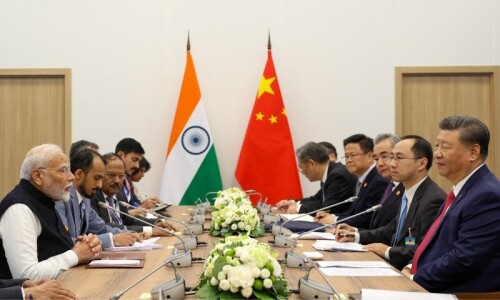INDIA : The Asian giants announced on Friday that they have begun implementing an agreement to end a military standoff on their disputed Himalayan border, marking the largest thaw between them in four years.
An Indian government source stated that troops had begun to retreat from two points on the frontier in the western Himalayas, signaling the end of the standoff.
This week, the nuclear-armed neighbors agreed to patrol the border, paving the way for President Xi Jinping and Prime Minister Narendra Modi to hold their first official talks in five years on the sidelines of a regional summit in Russia.
Lin Jian, a spokesperson for China’s foreign ministry, stated on Friday, “According to the recently agreed solution between India and China… their frontline armies are implementing relevant work, with smooth progress so far.”
A government official in New Delhi who was aware of the specifics said that troops from both sides had begun to leave the areas of Depsang and Demchok, where they had last stood face-to-face.
Because he was not permitted to discuss the matter with the media, the source agreed to speak on condition of anonymity.
A request for comment from Reuters was not immediately answered by the Indian foreign ministry.
The new pact, which is anticipated to help improve political and business ties damaged by a deadly military clash in 2020 that resulted in the deaths of 20 Indian and four Chinese troops in the Galwan Valley, has received no details from either side.
The different sides had before pulled ease troops from five other go head to head places, however the last withdrawal of troops occurred quite a while back.
Precautionary business easing On Wednesday, Xi and Modi agreed to increase cooperation and communication in an effort to assist in conflict resolution.
However, Indian officials stated that, given the trust deficit of the previous four years, New Delhi would continue to be cautious and is prepared to take only small steps toward establishing economic ties with Beijing.
India had virtually stopped all major proposals from companies like BYD and Great Wall Motors because it had banned hundreds of Chinese mobile applications, banned direct flights with China, and added layers of screening for Chinese investments.
According to two sources from the Indian government, as a complement to the recent decrease in tensions, New Delhi is not yet prepared to undo all of its actions against Beijing anytime soon. However, India would now consider opening its skies and expediting visa approvals.



